Affiliate marketing is a great way to generate passive income and promote products and services online. It’s an attractive option for those looking for a way to make money without having to invest large amounts of money upfront. But if you’re new to affiliate marketing, you may be wondering what type of affiliate marketing is best for you.
To understand it better read the “What is Affiliate Marketing” blog I posed a while ago.
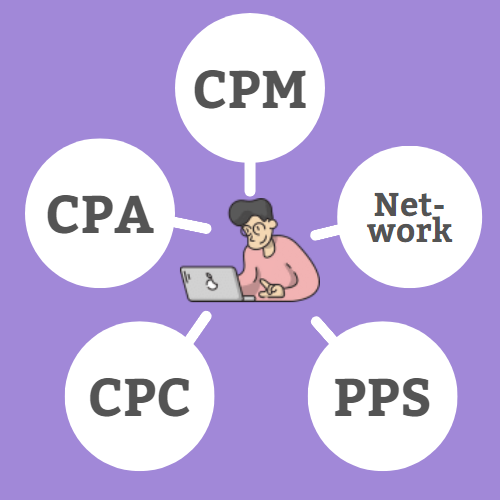
Once you get thru with the basic of Affiliate Marketing, the most valuable question arise, “How do an Affiliate can get paid?”.. After all we all wish to learn this specific detail, right!!
Well, I got you.!! I will try to elaborate easiest and the most popular methods of ways to get paid. Also will explain all the Advantages and Disadvantages to help you choose the right method.
In this blog, we’ll look at the 5 Main types of affiliate marketing and how each type works.
Table of Contents
Types of Affiliate Marketing:
Pay-Per-Sale (PPS):
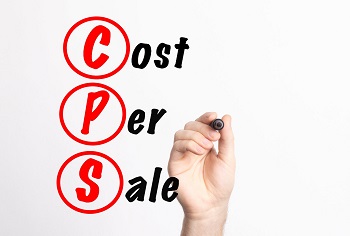
Pay-per-sale (PPS) or Cost Per Sale (CPS), affiliate marketing is one of the most common types of affiliate marketing. Under this model, you are paid a commission based on each sale that you refer. The commission rate is usually set by the merchant, and it can range from a few cents to a few dollars. This type of affiliate marketing is best for you if you have a large following or if you are an expert in a particular niche.
Best example is of Amazon, Flipkart like companies which has their Affiliate Programs and anyone can sign up and create Affiliate account and start promoting it thru various social media platforms and create sell for the products and earn commission.
For this you must select the category / niche in which you are comfortable in sharing relevant information to the general public. Understand your potential customers and gather enough knowledge as where these customers are active in, what they are looking for, what is popular requirement etc. Accordingly choose the Affiliate Programs available in Market.
Keep in Mind Commission on Sale of Physical products are less compared to that of Commission of Digital Products.
To know, which are the Best Affiliate Programs in India for these products, check out the detailed Blog I posted a while ago.
Advantages of PPS in Affiliate Marketing:
- Attractive Model: Pay per sale (PPS) is a very attractive business model for affiliate marketers as they get paid for every sale that is generated from their referrals. This gives them the opportunity to make a great income from their affiliate efforts.
- Cost Effective: It is a cost effective way for merchants and marketers to promote their products and services.
- Tracking Performance: It is an easy way for merchants to track the performance of their affiliates.
- Good relation: PPS also allows merchants to pay their affiliates on a regular basis, which helps to foster a good relationship between the two parties.
Disadvantages of PPS in Affiliate Marketing:
- Risker : PPS is a riskier business model compared to other forms of affiliate marketing since the merchant must pay out the affiliate even if the sale does not materialize.
- Competitive : PPS is a very competitive model, as affiliates are always looking to maximize their profits.
- Quality of Affiliate: It can be difficult to find quality affiliates to work with using this model.
Cost-Per-Click (CPC):

Cost-per-click (CPC) affiliate marketing is a type of affiliate marketing where you are paid based on each click that you refer to a merchant’s website. The commission rate is usually set by the merchant and it can range from a few cents to a few dollars. This type of affiliate marketing is best if you have a large following or if you are an expert in a particular niche.
The average CPC on Facebook is $0.94 , making it cheaper than advertising on LinkedIn, Instagram, or YouTube.
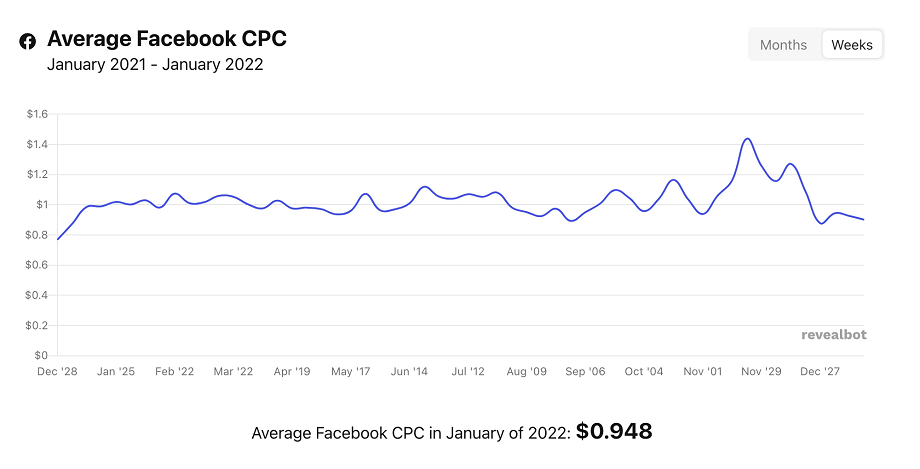
Advantages of CPC in Affiliate Marketing
- Cost-Effective: CPC is generally a more cost-effective strategy than CPA or CPM, as you only pay when a customer clicks on your affiliate link. This means that you only pay for the leads that you generate, which can help to reduce costs.
- Flexible: CPC campaigns are flexible, so you can adjust your bids, budget, and keywords to ensure that you are getting the most out of your affiliate marketing campaigns.
- Measurable: CPC campaigns are measurable, which allows you to track and analyze the performance of your campaigns and make changes accordingly.
Disadvantages of CPC in Affiliate Marketing
- Low Conversion Rates: CPC campaigns generally have lower conversion rates than CPA or CPM campaigns, as you are paying for impressions rather than for leads or sales.
- Low Quality Leads: Because CPC campaigns generate leads based solely on the keywords used, there is a risk of generating low quality leads that are not interested in your product or service.
- High Competition: CPC campaigns tend to attract a lot of competition, which can drive up the cost of bids and make it difficult to get your campaigns
Cost-Per-Acquisition (CPA):
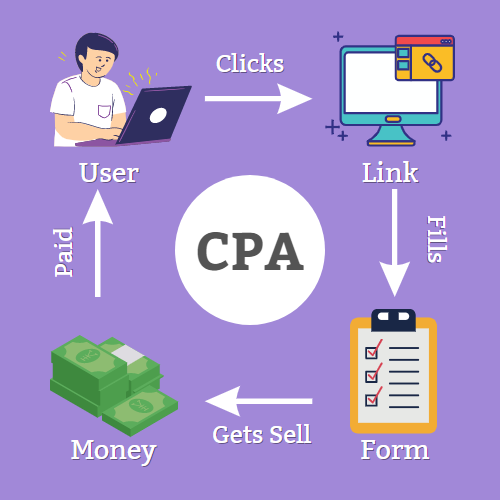
Cost-per-acquisition (CPA) affiliate marketing is a type of affiliate marketing where you are paid a commission based on each lead that you refer. The commission rate is usually set by the merchant and it can range from a few cents to a few dollars. This type of affiliate marketing is best if you have a large following or if you are an expert in a particular niche.
It is also known as pay-for-performance marketing because an affiliate is only paid when a desired action is completed. CPA affiliate marketing is one of the most popular types of affiliate marketing due to its high potential for earning.
Lead Generation is the main motive for this practice. This is why you get the Subscribe buttons, Signup for free buttons, Free Downloads etc kinds of options on websites, YT videos, game applications advertisements etc.
Brands use the platform to generate more email subscribers, which may turn into potential customers, to whom they can sell to in the long-term without factoring in repetitive ad costs.
The advantage of CPA is that it does not require an affiliate to generate a sale for the merchant. Instead, the affiliate is only required to get the customer to take a desired action. This could be anything from filling out a form, subscribing to an email list, or downloading an app.
The amount of commission an affiliate earns can vary greatly depending on the action that the customer takes. For example, an affiliate might receive a high commission for a sale but a smaller commission for a simple form fill. However, CPA affiliate marketing can still be lucrative because the commissions can be very high when compared to other types of affiliate marketing.
Another advantage of CPA affiliate marketing is that it is easy to set up. Unlike traditional affiliate marketing, an affiliate does not need to have their own website or blog in order to participate. All they
Advantages of CPA in Affiliate Marketing
- Increased control over campaigns: CPA allows you to have full control over your affiliate campaigns and track their performance with detailed reports. This allows you to make adjustments as needed to maximize your profit and effectiveness.
- Higher returns: CPA is a great way to make more money with your affiliate campaigns. You can earn more per sale and make more money overall by focusing on CPA rather than other methods.
- Easier to manage: CPA is simpler to manage and track than other affiliate marketing models. You don’t have to worry about tracking clicks or commissions, as all you need to do is track the sales you generate with each campaign.
Disadvantages of CPA in Affiliate Marketing
- Low conversion rates: CPA campaigns typically have lower conversion rates than other affiliate marketing models, as people are less likely to make a purchase if they have to pay for it upfront.
- Lower commissions: CPA commissions are typically lower than other affiliate models, as you only get paid when a sale is made.
- Limited to certain products: CPA is typically limited to certain products, so you may not be able to promote a wide range of products with this model.
Cost-Per-Mille (CPM):
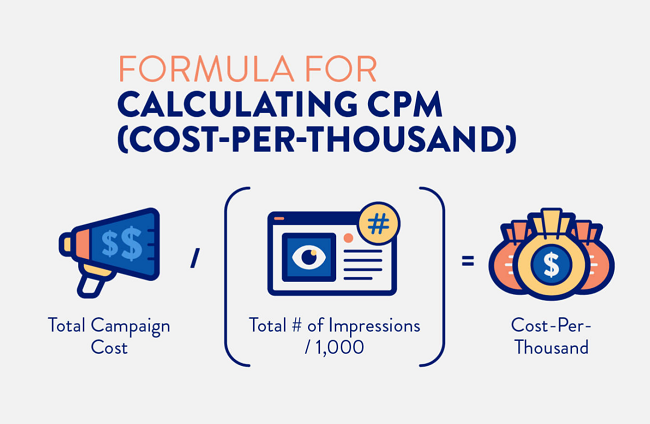
Cost-per-mille (CPM) affiliate marketing is a type of affiliate marketing where you are paid a commission based on each thousand impressions that you refer. The commission rate is usually set by the merchant and it can range from a few cents to a few dollars. This type of affiliate marketing is best if you have a large following or if you are an expert in a particular niche.
CPM affiliate marketing involves an advertiser and an affiliate. The advertiser pays the affiliate each time their advertisement is viewed. The affiliate then uses this money to promote the advertiser’s product or services on their website. An example of CPM affiliate marketing is an affiliate placing a banner ad on their website. Whenever someone visits the website and views the ad, the affiliate receives payment from the advertiser. The affiliate then uses this money to promote the advertiser’s product or services.
Facebook has such programs for advertisements for generating traffic and in turn sell. Another Example is the Instagram reels, which now had started paying the Creators for Reels that get particular Views.
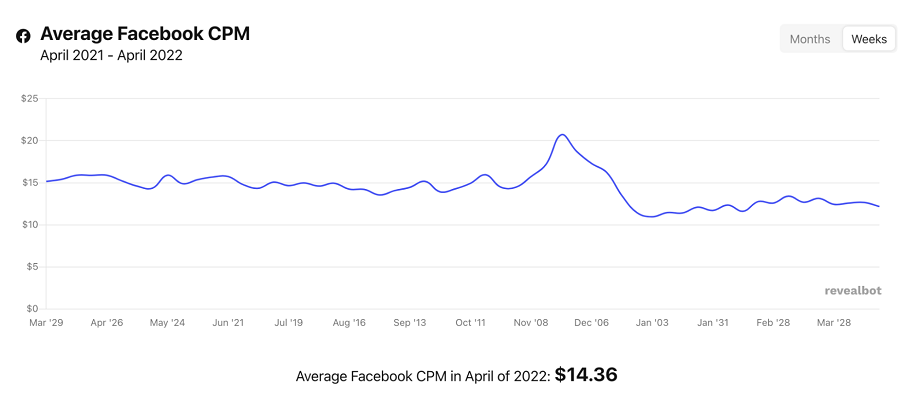
Advantages of CPM in Affiliate marketing:
- Transparency: CPM models offer more transparency for advertisers, as they can track the number of impressions made with each affiliate.
- Set own rates: CPM can be beneficial to affiliates, as they can set their own rates and receive payments for each impression.
- Better Affiliate traffic Sense : CPM offers a better understanding of the true value of an affiliate’s traffic.
- Easy to Set up : CPM campaigns are typically easier to set up than other types of affiliate campaigns.
Disadvantages of CPM in Affiliate marketing:
- Low Conversion : CPM campaigns often have a low conversion rate, as they are not necessarily designed to drive direct sales.
- Can be Expensive: CPM campaigns can be expensive, as advertisers often need to pay for each impression.
- Poor Trackability : CPM campaigns can be difficult to track, as there is no definitive way to measure the success of the campaign.
- Not Good for Low Traffic : CPM campaigns are not necessarily the best choice for low-traffic affiliates, as they may not generate enough impressions to make a significant profit.
Affiliate Network:
An affiliate network is a website that serves as a middleman between merchants and affiliate marketers. Affiliate networks provide merchants with access to a large pool of potential affiliates and also provide affiliates with access to a variety of merchants. Affiliate networks are a great way to find new opportunities to promote products and services and make more money.
Advantages of Affiliate Network in Affiliate Marketing
- Access to Multiple Programs: Affiliate networks provide access to multiple programs, allowing you to choose the program that best suits your needs. This saves you time and energy in researching and applying to individual programs.
- Easily Trackable: Affiliate networks provide tracking tools to help you track your sales and commissions. This makes it easier to monitor your performance and helps you to identify any areas where you can improve.
- Low Cost Entry: Affiliate networks generally have a low cost of entry, making it accessible to many people. This means you don’t have to invest a lot of money in order to start making money from affiliate marketing.
- Increased Visibility: By joining an affiliate network, you can benefit from increased visibility. This can help you reach a wider audience and generate more sales.
Disadvantages of Affiliate Network in Affiliate Marketing
- Lack of Personalization: Affiliate networks can’t offer the same level of personalization as individual programs. This can make it harder to build relationships with customers and could reduce your overall sales.
- Increased Competition: Affiliate networks can have a lot of competition from other affiliates, making it difficult to stand
Best Examples of Affiliate Marketing Companies
- ShareASale. ShareASale is one of the most popular affiliate networks out there. …
- Awin (Formerly Affiliate Window) …
- PartnerStack.
- Amazon Associates.
- Rakuten Marketing (Formerly LinkShare)
- Avangate Affiliate Network.
- ClickBank
These are the five main types of affiliate marketing. Which type of affiliate marketing is best for you will depend on your goals and your audience. Each type of affiliate marketing has its own advantages and disadvantages and it’s important to understand how each type works before deciding which type is best for you.
Most Important point to Keep in mind!!
Keep in Mind it’s not 21 days get rich Scheme, it’s more of Long term money generation practice that will surely help you make massive income, if you follow right methods, keep it clean, are ready to Learn and improve, and most importantly, have patience..!!
If you like this Blog do share with those you think it can be helpful to. Your view and comments on these blogs are always welcome. Do help us to improve if you can suggest something.
Also you can Read Following Blogs to gain More Knowledge on :-
- WHAT IS “AFFILIATE MARKETING” ?
- 5 MAIN TYPES OF AFFILIATE MARKETING
- Best Affiliate Programs in India 2023
Do Follow us on
Keep Learning, keep growing.
Take care.
Affiliate Marketing Disclaimer : This blog post may contain affiliate links. This means that if you click on a link and make a purchase, I may receive a small commission at no additional cost to you. Please note that I only recommend products or services that I personally use and believe will add value to my readers. I am a participant in the Amazon Services LLC Associates Program, an affiliate advertising program designed to provide a means for me to earn fees by linking to Amazon.com and affiliated sites. Thank you for supporting my blog and helping me to continue creating valuable content for you.
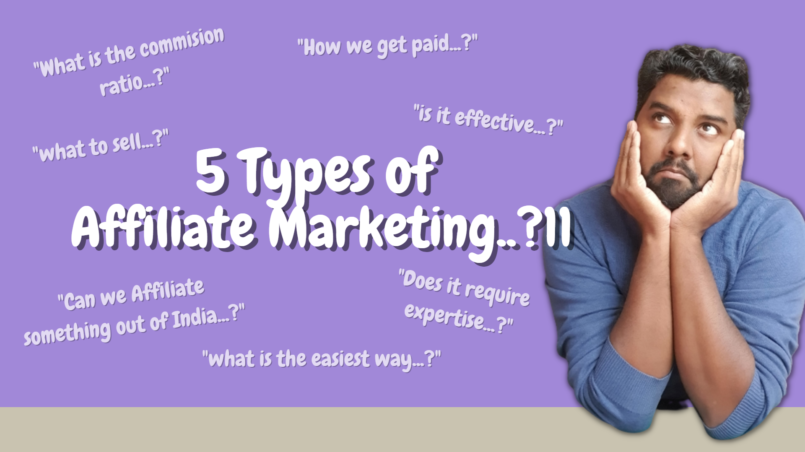







1 Comment